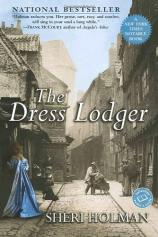Reading Group Guide
Discussion Questions
The Dress Lodger

1. Why do you think the novel opens by following Fos? How do you feel when you encounter her again later in Whilky's house? What does the movement with, then away, and finally back to Fos accomplish?
2. Describe the voice of the narrator in The Dress Lodger. How is the narrative voice different from that of most contemporary novels? Does the voice remind you of other books you may have read? Does the narrator play a role in the story? How do you, as a reader, react when the narrator addresses you directly?
3. How would you characterize Henry's feelings for Gustine? Is his behavior toward her reprehensible, or do the class-based restrictions imposed upon him thwart his good intentions? What are his intentions? Does he even know? Compare Henry's interactions with Gustine to his behavior with Audrey.
4. Compare the clearly articulated goals of the various characters: Gustine, the Eye, Pink, Henry, Audrey. What is each character striving for? What do you think about their goals? How do their efforts to do good and to be of use to others backfire, and are these characters responsible for their failure to realize their goals?
5. How would you characterize the relationship between Whilky and Gustine? Is she Whilky's slave or does she have other options? Is being a prostitute ever a moral issue for her, or even in the world of The Dress Lodger? Is Whilky evil for exploiting Gustine, or is he also a victim of the economic circumstances in Sunderland?
6. What do you think the social function might be of a play like Cholera Morbus, or Love and Fright? Why would people wish to see such a play? What did you think of the content of the play and of the audience's reaction?
7. Discuss the gulf between rich and poor in this novel. What are some of the more significant flash points of this divide? What do you think of Whilky's suspicion of the government and of doctors, and the general belief among the poor that the cholera epidemic is some kind of conspiracy? Are the wealthier characters also victimized or in some way injured by this social chasm?
8. Is there a metaphorical significance to Gustine's baby's condition? What do you make of his namelessness and his disease (and Henry's particular interest in it)? Do you think Gustine is attached to her child in ways she would not be if the child had been born perfectly healthy?
9. What function does the Student of Life have in this novel? What does his presence tell the reader about narrative? Is his goal of writing a book "spanning the great gulf that yawns between rich and poor" laughable or laudable?
10. What is the connection between prostitution and anatomy? Is Holman drawing an analogy? Does labor, in the general sense, form the third point of a triangle in this novel? In what ways is The Dress Lodger concerned with the economic uses to which the body is put?
11. What function does the Labor in Vain serve in The Dress Lodger? How does this space in which characters of various social classes congregate, work within the fabric of the novel? How does the name of the public house relate to some of the events of the story? Do the people in this novel labor in vain, and if so, is the pointlessness of their labor inevitable?
12. Henry says that he has "been wed to the graveyard since I first laid eyes on Dr. Knox." Is Henry in some way addicted to dissection? Would such an addiction explain his dubious actions in Edinburgh?
The Dress Lodger
- Publication Date: January 2, 2001
- Paperback: 320 pages
- Publisher: Ballantine Books
- ISBN-10: 0345436911
- ISBN-13: 9780345436917








